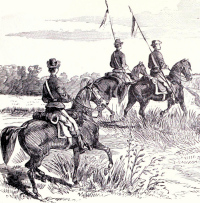Camp Lovejoy, October 7th. For the last two days the troops have been leaving Jefferson City, and the densely peopled hills are bare. This morning, at seven o’clock, we began to break camp. There was no little trouble and confusion in lowering the tents and packing the wagons. It took us a long time to-day, but we shall soon get accustomed to it, and become able to move more quickly. At noon we left Jefferson City, going due west.
Our little column consists of three companies of the body-guard, numbering about two hundred and fifty men, a battalion of sharp-shooters (infantry) under Major Holman, one hundred and eighty strong, and the staff. The march is in the following order. The first company of the guard act as advance-guard; then comes the General, followed by his staff riding by twos, according to rank; the other two companies of the guard come next. The sharp-shooters accompany and protect the train. Our route lay through a broken and heavily wooded region. The roads were very bad, but the day was bright, and the march was a succession of beautiful pictures, of which the long and brilliant line of horsemen winding through the forest was the chief ornament.
We reached camp at three o’clock. It is a lovely spot, upon a hill-side, with a clear, swift-running brook washing the foot of the hill. Presently the horses are tied along the fences, riders are lounging under the trees, the kitchen-fires are lighted, guardsmen are scattered along the banks of the stream bathing, the wagons roll heavily over the prairie and are drawn up along the edge of the wood, tents are raised, tent-furniture is hastily arranged, and the camp looks as if it had been there a month. Before dark a regiment of infantry and two batteries of artillery come up. The men sleep in the open air without tents, and innumerable fires cover the hill-sides.
We are upon land which is owned by an influential and wealthy citizen, who is an open Secessionist in opinion, though he has had the prudence not to take up arms. By way of a slight punishment, the General has annoyed the old man by naming his farm “Camp Owen Lovejoy,” a name which the Union neighbors will not fail to make perpetual.
Fremont’s Hundred Days in Missouri was published in three installments in The Atlantic Monthly. The anonymous author appears to have been a member of Fremont’s staff with a disdainful bias towards Missourians, even those who were pro-Union.
